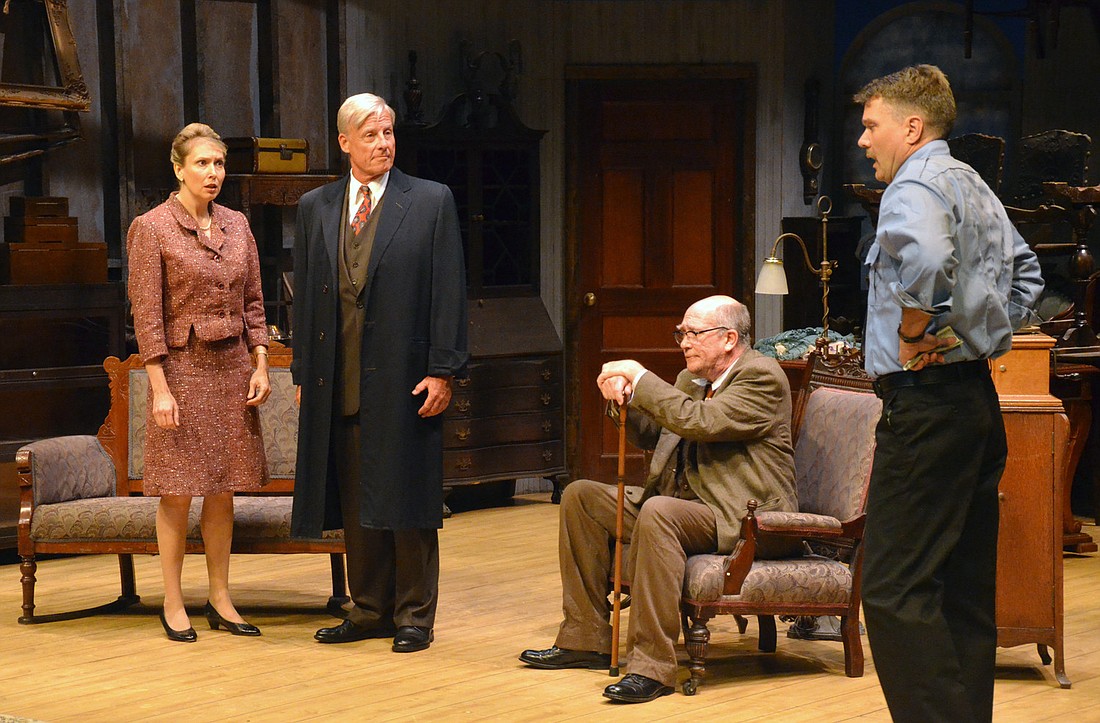- April 22, 2024
-
-
Loading

Loading

The Banyan Theater’s current production of Arthur Miller’s “The Price” unfolds in an old family apartment in 1968 in New York City . The apartment’s stuffed with old furniture and bad memories; the building is set for demolition; everything must go.
The task falls to Victor Franz (Charlie Kevin), a by-the-book New York City policeman on the verge of retirement. The once-ritzy stuff belonged to his once-wealthy father. The stuff’s been gathering dust here since the 1929 stock market crash wiped out his father’s fortune and crushed his spirit. Victor gave up his dream of a scientific career to take care of his father (who remains an emotionally shattered shut-in for life).
Victor’s brother, Walter (Peter Thomasson), gave up on his father (except for a token $5 a month payment) and pursued and achieved his dreams of being a wealthy surgeon. Despite his wealth, he refused to pay Victor’s college tuition. The brothers have remained estranged for years. Their father ultimately dies, but Victor puts off the furniture sale until the wrecking ball forces his hand. Walter enters the picture — not wanting a cut, of course, just wanting to help. Eighty-nine-year-old estate appraiser Gregory Solomon (Conrad Feininger) tries to mediate.
“With used furniture you cannot be emotional,” he says.
But, of course, you can. Clearing the old junk away forces the brothers to deal with old scores and old sores. Victor’s wife, Esther (Lauren Wood), stands by her man — though she wishes her man had more money.
The above only hints at the dense layers of personal story and political implication — this is, after all, an Arthur Miller play. Don Walker directs this material with snappy, naturalistic, almost easygoing rhythms. The powerful, simmering issues only gradually emerge — and powerful theater is the result. Walker’s deft sense of character and timing makes you feel like you’re eavesdropping on flesh-and-blood people.
The flesh-and-blood actors deserve credit here, too. Kevin’s performance is a true stand-out. He makes you believe in the wheels turning in his mind; the unspoken words behind the words he speaks. A great physical actor, too. He’s a thin guy, but — through body language alone — convinces you he’s an aging cop with a pot belly. Nice. Feininger’s Solomon is part comic relief — string his lines together, and they’d read like stand-up comedy. He’s also a dispenser of wisdom, as his name implies. Victor’s wife could’ve easily seemed shallow, but Esther’s nuanced characterization conveys her inner conflict between loyalty to her husband and desire for creature comforts. At first, Thomasson’s Walter comes off as Dr. Bigshot (he speaks with an upper crusty mid-Atlantic accent). That façade eventually crumbles as he reveals his true agenda — and the price Walter’s paid in his soul for his decisions.
It all takes place in a crowded, shabby genteel apartment that could double for a consignment shop. Excellent work by set designer Chris McVicker, who must have had fun digging up the old armoires, oars and fencing foils. Costume designer Ross Boehringer also does a fine job with the late-1960s clothing. When a costume drama doesn’t feel like a costume drama, you know you’ve done your work.
As to Miller’s work on the page, it’s sometimes a tad less convincing. It’s a great play but uneven. The first act is crisp, strong and true to life, with clever dialogue and comic rhythms — and not much expositional furniture to move. Walter only shows up at the end, which leaves only the second act for the brothers to get down to it. As a result, the consultation feels overstuffed with speeches and lawyerly cross-examination of motives. Miller successfully boxes up the exposition and moves it before the final curtain. But the job feels a little rushed.
To be fair, Miller had a novel’s worth of ideas, story and social commentary to express in this play. “The Price” reveals the same fascinations as “Death of a Salesman,” including sympathy for the common man, the male tendency to define self-worth as net worth and the stories we all tell ourselves to get by. Some stories are honest and some are rationalizations — especially when it comes to family and money.
The story of Miller’s play hits close to home.
The playwright’s own family had lost everything in the Great Depression. His brother, Kermit, dropped out of college to care for their father. Arthur became the brother who pursued college, career and success. Was it worth the price?
In 1968, Miller was clearly still asking himself this question.
He left it to the audience to find the answer.
IF YOU GO
“The Price” runs through July 13, at the FSU Center for the Performing Arts, 5555 N. Tamiami Trail, Sarasota. Call 351-2808 or visit banyantheatercompany.com for more information.